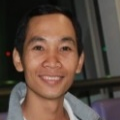
Quang-Ngoc Phung
Work place: College of Information and Communication Engineering, Sungkyunkwan University, Suwon 440-746, Republic of Korea
E-mail: ngocpq@skku.edu
Website:
Research Interests: Software Construction, Software Development Process, Software Engineering
Biography
Quang-Ngoc Phung received the BEng degree in IT from the University of Technology and Education, and the M.S. degree in Computer Science from the University of Science, Ho Chi Minh city, Vietnam in 2008 and 2013, respectively. He is now a Ph.D. scholar in the College of Information and Communication Engineering at Sungkyunkwan University, South Korea. His research interests include Self-Adaptive Software System, and Automatic Software Engineering.
Author Articles
Witness-Header and Next-Node Selection to Extend Network Lifetime in Energy-Efficient Clone-Node Detection in WSNs
By Muhammad K. Shahzad Quang-Ngoc Phung
DOI: https://doi.org/10.5815/ijitcs.2016.10.03, Pub. Date: 8 Oct. 2016
Wireless sensor network (WSN) has emerged as potential technology for their applications in battlefields, infrastructure building, traffic surveillance, habitat monitoring, health, and smart homes. Unattended nature of these networks makes them vulnerable to variety of attacks, the inherent stringent resources makes conventional security measure infeasible. An attacker can capture a sensor node to install number of clone nodes with same privacy information causing serious security threats and deterioration in network lifetime. Current, security scheme along with distinct advantages suffer from number of limitations. A good counter attacks measure should not only cater for security and energy-efficiency but network lifetime as well. In this paper, we propose a next-node selection method which consider residual energy and clone attacks ratio in addition to distance, in order to overcome the limitation of fixed path based shortest routing. These factors are also considered while selecting the witness header in WSNs. Results demonstrate the efficacy of the proposed schemes in terms of network lifetime.
[...] Read more.Other Articles
Subscribe to receive issue release notifications and newsletters from MECS Press journals